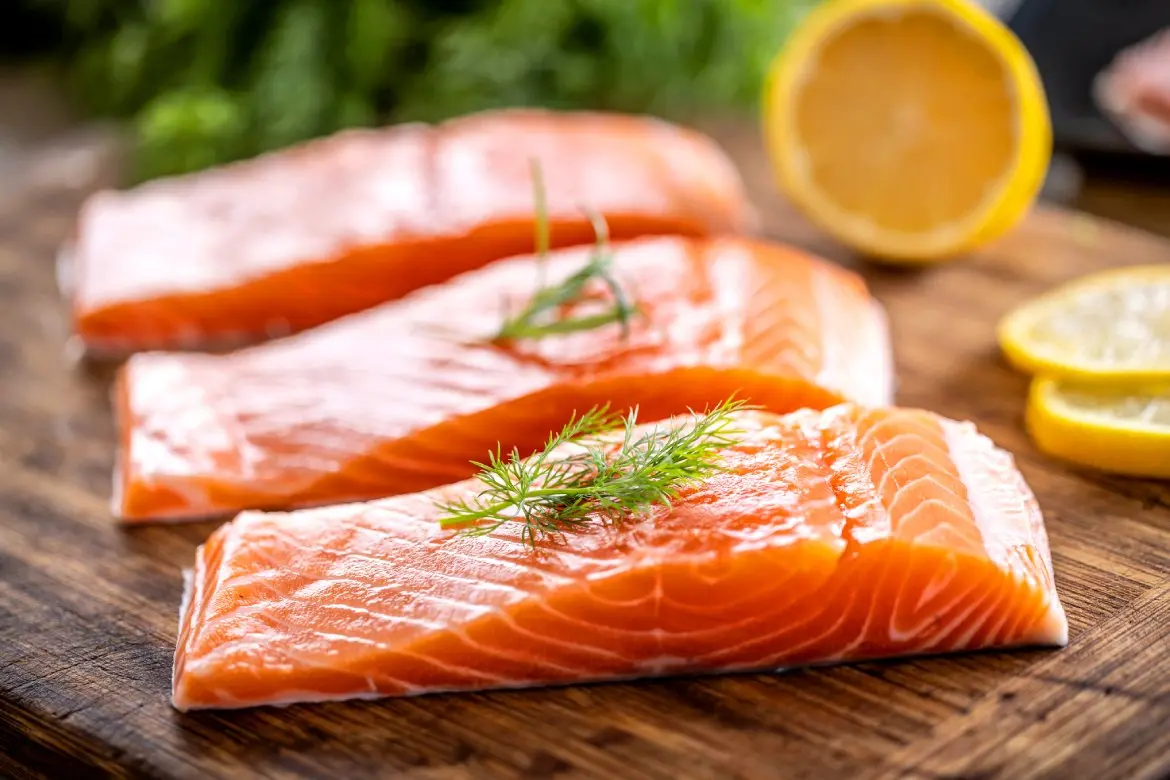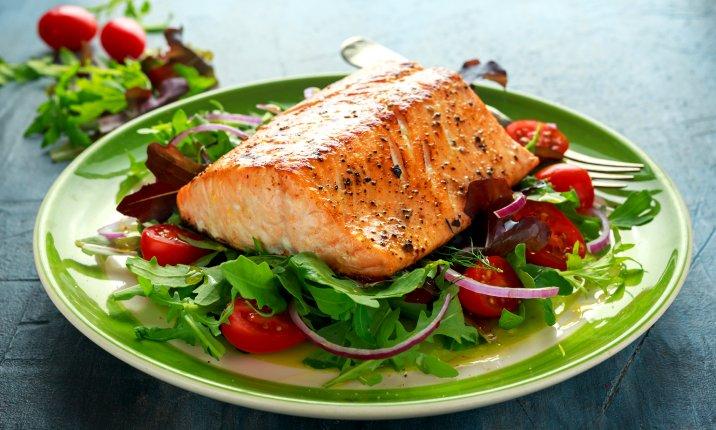This article has been reviewed by dietitian Candy Goh from Parkway MediCentre.
Salmon is a pretty popular fish worldwide — the global salmon market is expected to reach between US$32 billion and US$72 billion by 2031. Its rich, buttery meat, coupled with the diverse cuisines it can be used in, thanks to its ability to be eaten raw, smoked, or cooked, are all contributing factors to its global success.
Of course, there’s another major proponent of the decadent fish’s success — the health benefits it offers. Salmon is no stranger to the limelight when it comes to being known as a fish that is good for health. But how healthy is it for you, really? And does the type of salmon you eat affect the fish’s nutritional value? Let’s find out.
What are the health benefits of salmon?
Let’s start by understanding the general, overall health benefits of salmon.
Salmon and heart health
Salmon cares for your heart — for one, it contains omega-3 fatty acids. These superstar fats, in particular EPA and DHA, helps to reduce inflammation, lowers blood pressure and improves cholesterol levels (may raise good cholesterol (HDL)).
Another way this cold-water native helps with your beating heart is through its rich potassium content, which can also help to regulate blood pressure by relaxing the walls of blood vessels and counteracting the sodium-raising effects of other foods.
Salmon and brain health
The omega-3s that salmon contains also play a crucial role in your brain function, potentially reducing the risk of dementia, Alzheimer’s disease, and cognitive decline. The fish is also a great food source for vitamin B12, which plays a crucial role in nerve function. Vitamin B12 is also essential for maintaining good memory and cognitive function, and helps with the formation of red blood cells and DNA synthesis.
Salmon and bone health
Salmon is a great source of vitamin D, which is critical for calcium absorption and building strong bones, potentially preventing osteoporosis. Salmon is also abundant in phosphorous, which is another vital mineral for bone health.
Other reasons why salmon is good for you
- Anti-inflammatory. The omega-3s salmon contains have anti-inflammatory properties that can help reduce joint pain and inflammation associated with conditions like arthritis.
- Vitamin A. This is good for your vision and immune function.
- Vitamin B6. This vitamin is important for energy metabolism and mood regulation.
- Protein. Salmon is a complete source of protein, providing essential amino acids for muscle building and repair.
- Selenium. This trace mineral forms an essential component of various enzymes and proteins in our body that help to make DNA and works as an antioxidant that protect against cell damages, inflammation and infections.
Now that we know the general health benefits of salmon, let’s take a more nuanced look at the nutritional profile of this popular fish by uncovering whether or not all salmon are created equal.
What is the best salmon to eat (health-wise)?
We’re spoilt for choice when it comes to choosing salmon. There’s wild-caught, farmed, various species to choose from, and of course there’s the decadent smoked variety. As a rule of thumb, pregnant women should avoid raw salmon — and when it comes to smoked salmon, they should only eat hot smoked salmon (74℃).
Let’s start by understanding if there’s a difference in nutritional value when comparing wild-caught and farmed salmon.
Wild-caught vs farmed salmon
The truth is, the nutritional differences between wild-caught and farmed salmon aren’t really anything to write home about. In general, wild-caught varieties are known to be more nutrient-dense when it comes to omega-3s, proteins, and some select nutrients.
Farmed varieties, on the other hand, are known to be more nutrient-dense when it comes to fat content. This means some farmed varieties actually contain more omega-3s than wild varieties, but it also means they are higher in saturated fats.
In the realm of contaminants like mercury, farmed varieties generally have lower levels than wild varieties. That said, all varieties have levels of mercury that fall far below international safety standards.
But since these nutritional differences aren’t vast, making a choice between wild or farmed salmon might instead come down to taste, personal preference, and conviction regarding the environmental impact farmed salmon has and the conditions such fish are raised in.
Species of salmon
Even when it comes to species, salmon generally maintains its nutritional value. Let’s take a look at 3 salmon species that are sold in Singapore:
- New Zealand king salmon. This premium variety is known for its vibrant orange flesh, rich buttery flavor, and high Omega-3 content. It’s typically more expensive than Atlantic salmon.
- Alaskan wild sockeye salmon. This is an Alaskan wild salmon that is prized for its intense flavor and red-orange flesh.
- Atlantic salmon. This is the most widely available, usually farmed in Norway or Chile. It is well-known for its rich flavor and buttery texture.
So, how do they fare against each other nutritionally? The table* below breaks it down:
| Nutrient | New Zealand King Salmon | Alaskan Wild Sockeye Salmon | Atlantic Salmon (Farmed) | Atlantic Salmon (Wild) |
|---|---|---|---|---|
| Omega-3 Fatty Acids (mg/100g) | 2,342 | 859 | 2,506 | 2,018 |
| Potassium (%DV/100g) | 11 | 9 | 10 | 14 |
| Vitamin B12 (%DV/100g) | 22 | 186 | 54 | 53 |
| Vitamin D (%DV/100g) | 100 | 84 | 100 | 100 |
| Selenium (%DV/100g) | 52 | 64 | 34 | 52 |
| Vitamin A (%DV /100g) | 9 | 6.5 | 1 | 1 |
| Vitamin B6 (%DV/100g) | 20 | 28 | 32 | 41 |
| Protein (g/100g) | 19.9 | 27 | 20.4 | 19.8 |
*The values in the table are an estimate
Source: USDA Food Composition Databases
Key takeaways
The nutritional benefits between wild-caught and farmed, as well as between the various salmon species, don’t have too drastic of a variation across the board, with the exception of Alaskan wild sockeye salmon in the area of omega-3 fatty acids and vitamin B12.
When choosing a salmon option for you and your loved ones, prepare them with a healthier cooking method and choose one that suits your budget, taste, and ethics with regard to environmental impact and sustainability. And of course, if you’re pregnant, avoid raw salmon, and only eat hot-smoked salmon (74℃), never the cold-smoked variety, so as to avoid foodbourne illness.
If you’re considering taking a step towards better health, your diet plays a crucial role. Whether you want to learn more about how your diet can directly impact your heart, brain, bone, or gut health or want a tailor-made diet, our dietitians are happy to help guide you along your health and wellness journey today.














